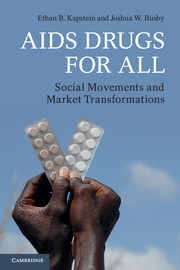Book contents
- Frontmatter
- Contents
- Preface
- Figures
- Tables
- Abbreviations
- 1 Introduction: global markets and transnational social movements
- 2 Industry structure and movement opportunities
- 3 Drugs = life: framing access to AIDS drugs
- 4 Movement coherence and mobilization
- 5 Advocacy strategies to address costs
- 6 Institutions to stabilize the market
- 7 Lessons for other campaigns
- 8 Conclusions: implications for research and policy
- References
- Index
3 - Drugs = life: framing access to AIDS drugs
Published online by Cambridge University Press: 05 June 2014
- Frontmatter
- Contents
- Preface
- Figures
- Tables
- Abbreviations
- 1 Introduction: global markets and transnational social movements
- 2 Industry structure and movement opportunities
- 3 Drugs = life: framing access to AIDS drugs
- 4 Movement coherence and mobilization
- 5 Advocacy strategies to address costs
- 6 Institutions to stabilize the market
- 7 Lessons for other campaigns
- 8 Conclusions: implications for research and policy
- References
- Index
Summary
People With Aids Are Dying Because of Lack of Access to Life-Saving Drugs
1999 MSF Press ReleaseMSF Calls on Davos Leaders to Stop People Dying of Market Failure
2000 MSF Press ReleaseWhy do some appeals by advocates generate strong public support while other equally deserving issues fail to motivate a similar response? In a sense, this question animates our entire book. As we argued in the introductory chapter, advocates in support of market transformations need to identify and publicize a compelling frame. This statement begs the question of what counts as “compelling” and why it is important. In this chapter, building on the groundbreaking work of Margaret Keck and Kathryn Sikkink, we develop an empirically-informed account of what constitutes a compelling moral frame and why such a frame is a necessary but not sufficient factor in advocacy success.
We address these issues in reverse, starting with a short exposition of framing and why it is important. The second section explores what constitutes a “compelling” frame. The third section discusses what frames advocates and opponents used as they made the case for and against universal access to AIDS treatment. The final section draws on surveys that we conducted and which provide some empirical support for our view.
- Type
- Chapter
- Information
- AIDS Drugs For AllSocial Movements and Market Transformations, pp. 58 - 95Publisher: Cambridge University PressPrint publication year: 2013



